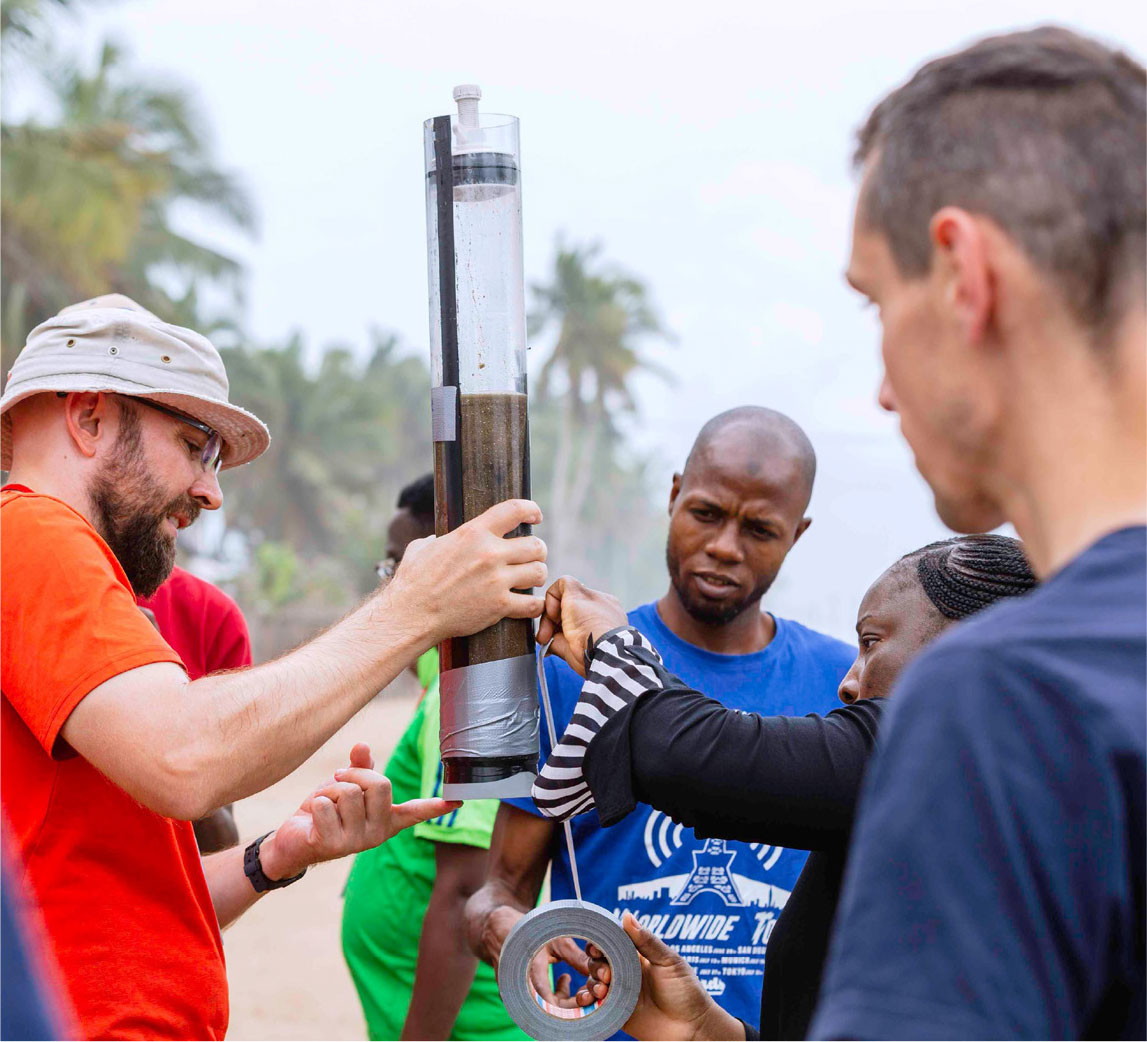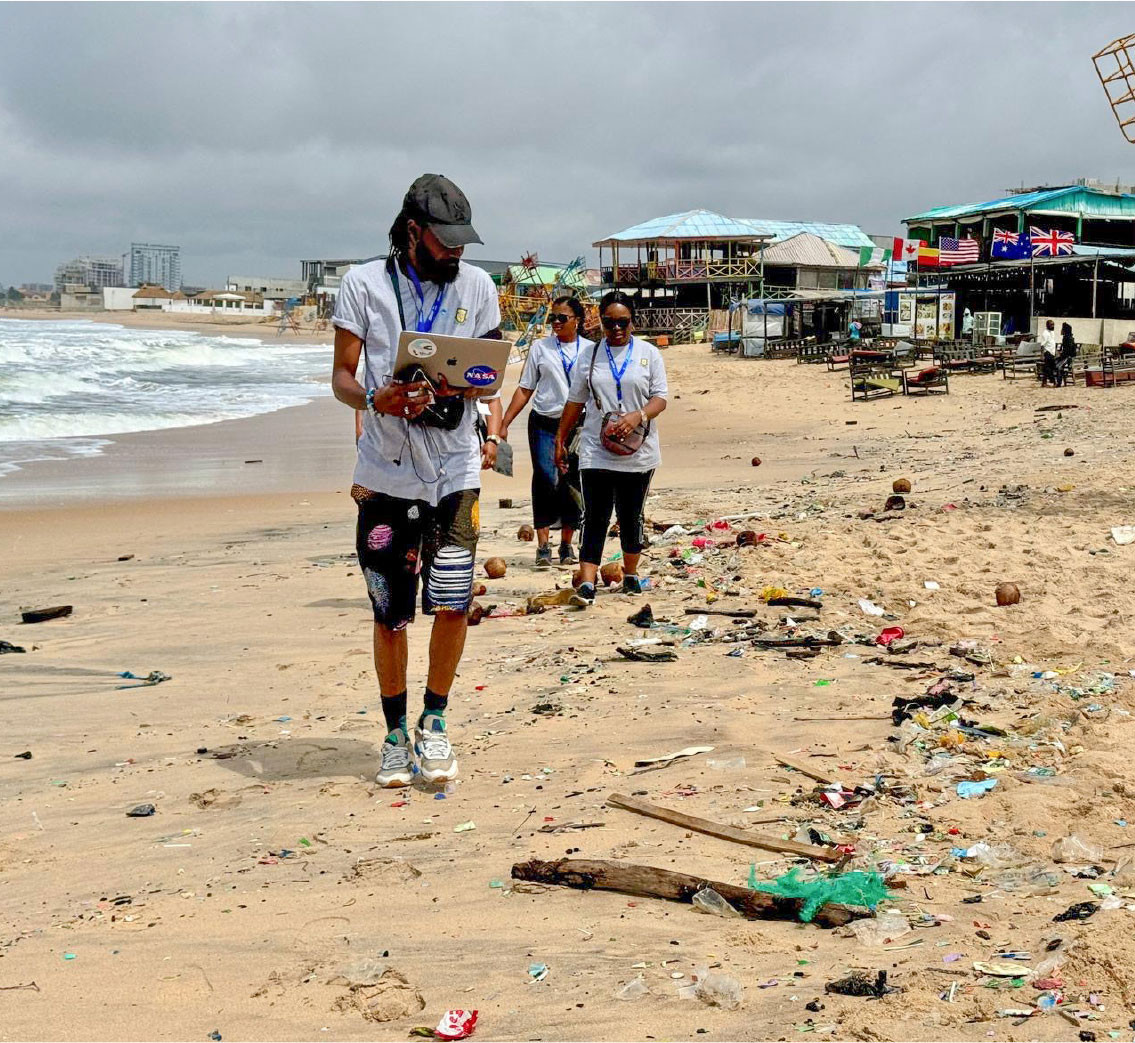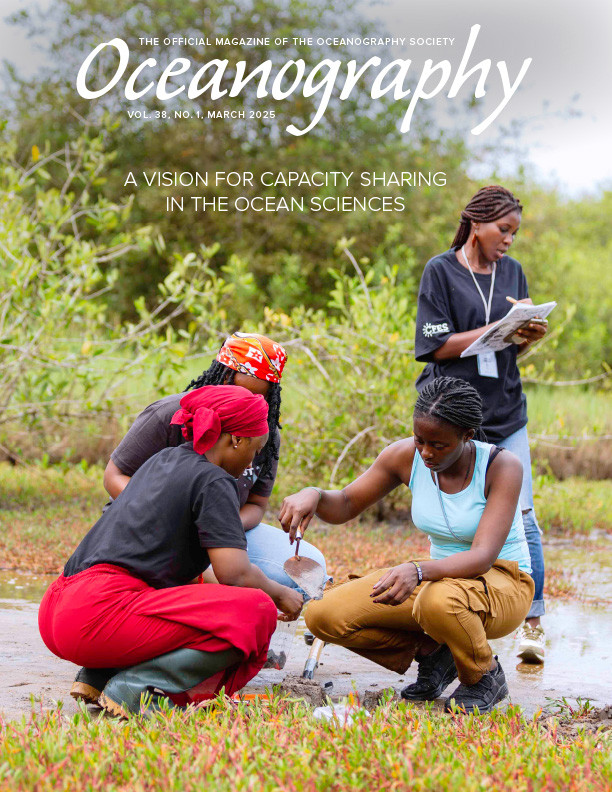Introduction
The ocean and its coastal environments provide important services and benefits to humankind. They supply food and serve as a source of economic livelihoods and wealth through activities such as fishing, oil and gas extraction, and tourism (Konar and Ding, 2023). However, the unsustainable use of marine resources poses significant risks to the health of the ocean and its environments. These risks include coastal and offshore pollution; illegal, unreported, and unregulated (IUU) fishing; habitat loss; and coastal flooding and erosion (Konar and Ding, 2023). While many of these threats originate locally, their impacts can reach far beyond their points of origin.
Ocean science is a global field of study, requiring the participation of all. Yet, many countries, especially developing ones, lack adequate expertise and tools in many aspects of ocean science. The UN Decade of Ocean Science for Sustainable Development (2021–2030) has highlighted the need to overcome this barrier by focusing one of its 10 challenges on the sharing of skills, knowledge, and technology (Guan et al., 2023). One way of addressing the shortfalls in ocean capacity is through project-based learning (PBL) during summer schools. These programs bring together students, early career professionals, and experts for one to two weeks of hands-on training on selected topics of interest.
PBL, a “learning by doing” approach, is an educational method in which participants investigate real-world issues through individual and collaborative projects (Kimani, 2024). It involves developing practical solutions to actual problems and fosters participants’ creativity and complex problem-solving skills as they work in small groups. PBL integrates core subject matter, allowing participants to gain knowledge in key areas while honing their problem-solving, practical, and collaborative abilities. As a capacity-building framework, PBL promotes co-creation of learning by engaging both learners and instructors in a shared process that creates a sense of ownership (Kimani, 2024). In this approach, learners take on roles as consultants and co-researchers, collaborating actively with instructors and peers to design and develop learning activities (Bovill, 2020). This process enhances participants’ motivation to learn and share knowledge by nurturing autonomy, competence, and relatedness (Maddens et al., 2023). Through this collaboration, learners benefit from the expertise of instructors while also contributing their own knowledge to peers and instructors. When learners work together to find solutions to real-world problems, they develop a deeper understanding of the concepts involved, which they can later apply in practice or pass on to their own mentees (Maddens et al., 2023).
COESSING
We use PBL as a tool to build capacity in ocean sciences during the Coastal Ocean Environment Summer School in Nigeria and Ghana (COESSING; https://coessing.org). For more details on COESSING, see Arbic et al. (2025, in this issue). In brief, COESSING began in 2015 and brings together scientists from the Global North and West Africa for a week (in July/August) to develop and share expertise in ocean-related topics. Over 1,000 scientists have participated since its inception. The summer school is advertised through the COESSING website, social media (e.g., Facebook, X, WhatsApp), and university websites across West Africa. Applicants are asked to indicate their experience levels, areas of interest, and what they hope to gain from the summer school. For the recent 2024 summer school in Nigeria, about 600 applications were received, and 120 participants were selected. The local organizing committee manages the selection process, ensuring a balance across career stages (undergraduates and graduate students, early career professionals, government officials, private-sector representatives, and nongovernmental organizations) from fields such as oceanography, fisheries, natural sciences, and environmental management. The committee also ensures gender, regional, and national diversity. The summer school is free of charge; participants are only required to cover their transportation costs to the venue. Accommodation and meals are provided for the duration of the program.
In its early years, COESSING primarily consisted of in-class lectures. Over time, it evolved to incorporate PBL through field and laboratory work, data analysis, and research presentations. This shift from lecture-based teaching to PBL was driven by feedback from participants, who emphasized that much of the teaching in West Africa is theoretical and expressed a desire for more substantial practical training (Nyadjro et al., 2022). To address the diverse needs of participants, their home countries, and communities, four themes were identified for projects: fisheries and conservation, biogeochemistry (Figure 1), physical and satellite oceanography (PSO), and the science-to-policy aspects of plastics (Figure 2). Approximately 30 participants are assigned to each project, and the project contents are co-designed with the participants. The framework includes understanding the problem, identifying knowledge gaps, developing resources, applying the acquired knowledge, and reflecting on insights gained. Through this process, participants learn scientific concepts, utilize multifaceted data and approaches, test hypotheses, and build knowledge, which they later apply to their dissertations, research projects, and careers. The summer school begins with an orientation session, where participants are introduced to key topics such as research ethics, community engagement, and scientific communication. The following days involve field sampling, laboratory analysis, data analysis, and the development of reports and presentations. While the PSO project is typically conducted in a computer laboratory, the other three projects involve field trips.

FIGURE 1. COESSING 2023 participants examine a sediment core at Winneba, Ghana. > High res figure
|

FIGURE 2. COESSING 2024 participants conduct plastics sampling at Elegushi Beach, Lagos, Nigeria. > High res figure
|
Projects in the PSO group typically focus on studying coastal upwelling, ocean circulation, and air-sea interactions. Through these projects, participants receive training in Python programming; in obtaining, processing, and analyzing satellite data; and in numerical modeling. Python is chosen because it is a free and open source software (FOSS). Commercial software like MATLAB is often prohibitively expensive; for instance, a student license costs around $100 USD, which is beyond the budget of many African students and researchers. In situ data acquisition is also costly and limits ocean research in many developing countries. For example, sampling West African waters on a research vessel can cost about $5,000 USD per day, excluding crew fees, fuel, and other expenses (Nyadjro et al., 2022). Consequently, training in satellite-derived data, which is extensive, repetitive, and often freely available, enables researchers to undertake significant studies relevant to their countries. However, satellite measurements are limited to the ocean surface. To extend their utility, they can be used to initialize and run numerical models. Ocean modeling is relatively inexpensive, provides high spatial and temporal resolution, and can predict the future state of the ocean. At COESSING, ocean modeling training involves teaching participants to install the Unix operating system (widely used for running ocean models) on their computers, to download and install models such as the Regional Ocean Modeling System (ROMS) or MITgcm, to run various test cases, and to analyze model outputs. The COESSING testimonials page (https://coessing.org/testimonials/) showcases success stories of participants applying the skills learned. For example, one PhD student used Python programming skills acquired at COESSING to build and employ a reliable very low-frequency receiver for dissertation research. By developing a Raspberry Pi setup, this student reduced computer energy consumption from 300W to 10W—a crucial saving in a country with unreliable electricity, where personal electric generators are often used. Through COESSING, participants have successfully combined FOSS, freely available data, and numerical models to execute codes, produce quality plots, and publish scientific research based on work done using computers.
The field projects train participants in sampling site selection, sampling design, data collection, quality control, and sample preservation. The fisheries and conservation group visits fishing villages or landing sites/harbors to collect fish samples for species identification, health assessments, and biodiversity studies. Additionally, the group administers questionnaires to fishermen, fish processors, sellers, and other community members to gather information about their fishing methods, processing technologies, and conservation knowledge. By incorporating local knowledge, traditions, and cultural beliefs, the group develops management and conservation guides tailored to the specific needs of the communities. The biogeochemistry group has helped participants develop skills in spectrometry, genomics, and sedimentology. Projects include examining sediment cores to investigate the composition, structure, and layering of sediments over time. The sediment cores are also analyzed to quantify concentrations of carbon, phosphorus, and other nutrients. These results help participants to understand the impacts of industrialization, agriculture, and urbanization on aquatic ecosystems at the study sites, which have included mangroves and oyster farms. After the summer school, communities were engaged in mangrove conservation and estuarine water quality management efforts. The findings have also been used to develop a habitat suitability model for oysters and to pilot oyster restoration initiatives aimed at assisting stakeholders’ businesses (Mahu et al., 2022).
The plastics science-to-policy group trains participants on rapidly increasing plastic pollution and how information is gathered for prevention, monitoring, public education, and resource management. Plastics are ubiquitous and their impacts are vast and alarming, affecting coastal communities, marine ecosystems, marine life, and human health. During COESSING, participants sample beaches, which, as part of the land-sea interface, are particularly vulnerable to plastic pollution from both human activities and seawater interactions. The group also participates in nurdle hunts, contributing their findings to the Nurdle Patrol database (https://www.nurdlepatrol.org/app/). Sampling for plastics is conducted using low-cost technologies and methods, ensuring that participants are not hindered by financial constraints and can continue applying their knowledge to environmental preservation. Participants collect plastic samples, analyze them in the laboratory, and identify their shapes, sizes, colors, and polymer types. The data are then visualized and presented using tools like Python and ArcGIS. Many participants have continued to pursue plastic research, secured grants, and implemented plastic pollution mitigation measures in their communities. One notable COESSING pioneer participant was inspired to launch the successful NGO Plastic Punch (https://plasticpunchngo.org/), which combats plastic pollution in Ghana and Nigeria.
Lessons Learned
Feedback is paramount. Valuable lessons have been learned as we transitioned from a small, lecture-only summer school to a larger, more impactful program with a hands-on, PBL-focused approach. The growth and change in perspective have largely been driven by feedback from host institutions, participants, and instructors. It is essential for program organizers to remain open-minded and receptive to new ideas. At the end of each summer school, both instructors and participants complete questionnaires designed to evaluate various aspects of the program, such as preparations, communication, admissions, and the projects. They also reflect on the skills they acquired and shared and provide recommendations for future improvements. These responses are carefully reviewed and discussed during post-school meetings with instructors. The decision to transition from an all-lecture format to include experiential learning came from feedback after the first summer school in 2015. The format evolved to offer morning lectures followed by PBL in the afternoon, and the last two summer schools have been purely PBL-focused. Feedback and idea sharing about COESSING extend beyond questionnaires. We maintain email lists and WhatsApp groups for all members, instructors, and project groups so that ideas can be continuously shared, achievements celebrated, and academic and professional opportunities posted.
Time and dedication. Developing, organizing, and sustaining a program like COESSING require a lot of time and dedication. The people involved in the program all do so on a voluntary basis. Preparations usually start about 10 months before the event, initially with biweekly meetings and transitioning to weekly meetings as the event draws near. The planning meetings span time zones across continents, with some organizers attending at odd hours in their local time zone.
Community engagement. PBL activities that involve field sampling should incorporate strong community engagement. Our sampling sites are chosen in collaboration with host institutions and participants who have local knowledge about where the most learning and impact can occur. Community engagement is crucial for building trust, fostering cooperation, and ensuring cultural sensitivity and respect. It also facilitates the sharing and implementation of PBL outcomes, such as controlling plastic pollution on beaches or avoiding the use of dyes on fish. Identifying key figures in the community, such as chiefs and youth leaders, helps facilitate engagement. Before the summer school begins, we engage with community leaders to brief them on our activities, objectives, and the benefits of the output for their community. Without this step, communities may refuse to cooperate with our activities. We observed that residents at our study sites were sometimes skeptical of outsiders entering their spaces; some even believed we were government officials collecting information that could be used against them, such as for tax imposition. The involvement of COESSING’s local organizing committee members, who could speak the local language, was instrumental in gaining trust and securing access to the communities. In some instances, inadequate engagement led to challenges once the team arrived on site. Proper attire also played an important role in building rapport and ensuring successful engagement.
FOSS and open-access data. We have received positive feedback from participants who have advanced their education, research, and careers using the FOSS and open-access data introduced at COESSING. Many participants were previously unaware of the numerous open-access data repositories (e.g., NASA, NOAA, USGS) available for their work. FOSS has enabled them to tackle big data analytics, gain deeper insights into their research, and publish in high-impact journals. Thus, providing access to computing resources and data is crucial for advancing oceanographic capacity in underserved communities. However, a significant hindrance, both for participants and the efficient execution of some summer school projects, is the lack of reliable internet access. The internet is essential for holding webinars, downloading course materials, accessing FOSS, and retrieving data. To mitigate these challenges, we have used open cloud computing platforms (e.g., JupyterHub) for teaching and data analysis. This approach eliminates the need for participants to install software or download data onto their local computers. Despite these efforts, reliable internet access would greatly enhance the participants’ ability to achieve even more.
Continuous funding. Sustaining capacity sharing is essential in order to keep pace with the ever-changing and complex nature of ocean and climate-related issues. Maintaining momentum helps sustain interest and connections, ensures continuity, and builds on past achievements. While we aim to include repeat participants to enhance their scientific growth, we are limited by funding and the need to provide opportunities for others who aspire to experience COESSING. Our funding success has largely been driven by the persuasiveness of lead principal investigator Brian Arbic, the success of our program, and funders who recognize the potential of developing capacity and relationships in West Africa.
Acknowledgments
We thank the two anonymous reviewers and the editor of Oceanography for their valuable feedback, which greatly improved the quality of the manuscript.



